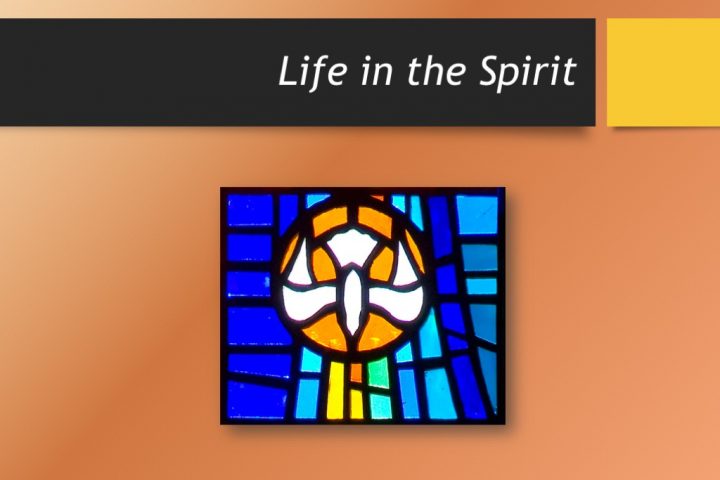Sermons by Brian Morgan (Page 5)
Paul Among the Philosophers
Acts 17:16-34
Athens was not originally part of Paul’s agenda for mission, but God had other plans and placed Paul right in the cultural and philosophical center of the world. As N. T. Wright observes, “This demands a different game plan, a different strategy… Athens is a major showdown between the new young faith and the old, established, tried and tested philosophies of the Western world, which still, in various modern guises, dominate people’s thinking.” Paul’s remarkable speech to the Athenians is an example of how we need to think creatively to engage our intellectual world with the gospel.
Bonds of Love Born in Affliction
Acts 17:1-15 After Paul and Silas are forced to leave Philippi after the shock of public beating and imprisonment, they arrive in Thessalonica only to have their troubles follow them with even more intensity, resulting in an official ban from ever returning to the city. How surpising it must have been that out of these afflictions, the strongest bonds of unaffected love and support were formed by people they had only just met. Is this what Paul meant when he later wrote, “nothing can separate us from the love of Christ?”
The Gates of Hell Will Not Prevail
Acts 16:25-40 The Gates of Hell Will Not Prevail
Last week we examined the question, How do we make inroads with the gospel living in a foreign culture? We began to see how Paul and Silas made Jesus known by submitting to unjust suffering. In our text this week we will see how God vindicates his servants through prayer and praise. As Peter later wrote, “And after you have suffered a little while, the God of all grace, who has called you to his eternal glory in Christ, will himself restore, confirm, strengthen, and establish you” (1 Peter 5:10-11). God never abandons his servants!
Prayer, Prison and Praise in Philippi
Acts 16:16-25
After a surprisingly great beginning for the gospel in a predominantly pagan city with the conversion of Lydia and her household, evil strikes back with force. Paul and his friends are confronted first by strange spiritual forces, then attacked by businessmen enraged by greed, and finally religious and political prejudices add fuel to the fire, creating a riot that lands Paul and Silas in prison. What do we do when evil is allowed to play every card in its hand with impunity? Is God still in control?
Closed Doors, New Horizons
Acts 16:6-15
In our text this Sunday, Paul, Silas and Timothy launch out into new territory to advance the gospel, but with no real sense of direction. Whichever way they turn the road is blocked for more than 200 miles. Given that Paul had a clear and proven strategy plus an exceptional team, it seems strange that the only divine direction they get is negative. They seem caught in a liminal space, the space in-between the “tried and true” and a new beginning. It is an uncomfortable place to be with no clear direction, but from a Biblical perspective these times are essential for our spiritual formation. If we embrace them, they deepen and matures us in ways our that our fervent activities cannot and lead us to new thresholds of opportunity.
When Leaders Disagree
Acts 15:36-16:5
In Psalm 133 the psalmist joyously proclaims, “Behold, how good and pleasant it is when brothers dwell together as one!” This was Jesus’ overriding prayer for his disciples – “that they may be one even as we are one… so that the world may know that you sent me” (John 17:21-23). When the Holy Spirit was unleashed on the day of Pentecost the dream came true – the disciples shared all of life “together” with one mind and heart. Then suddenly a rupture occurs at the highest level of leadership. Emotions get heated, tempers rise and a fissure erupts with leaders parting ways. What drives leaders to disagree? How should it be handled? What does God do when things are not resolved amicably.
Holy War, Are You Ready?
Josh 6:1-27
Almost everyone is familiar with the battle of Jericho and its theme song “the walls came a-tumbling down.”
But few understand the nature of “holy war” and how the theme developed in the Old Testament and was taken to new levels with the coming of Jesus. Though the methods of our warfare have changed, the theology in these texts is extremely profitable for our instruction.
Breaching Walls and Building Bridges
Eph 2:11-18 For our New Year’s Eve Sunday services Brian Morgan will give us a preview of the preaching calendar for 2018. Living in an age of destructive prejudice and divisiveness, we need to know what our calling is as Christians. Are we prepared to take new territory? What enemies will we face? Who will guide us? And what strategy do we employ?
Life in the Spirit
Col 1:15-20 The apostles never grew tired “reminding” their hearers of the essential truths of the gospel that they held dear. To be reminded of the “essential” values of our faith helps us keep the “main thing” the “main thing,” lest we drift, which is so easy to do. It is also helpful to articulate our particular distinctives as a local church to help you connect, serve and worship. During the month of September we will expounding on the values we hold dear at PBCC. The goal is to give us roots and wings, but as the poet Juan Ramón Jiménez writes, “let the wings take root and the roots fly.”
Preserving Freedom for All
Acts 15:1-29 The Apostolic Council in Acts 15 is the watershed moment in the book of Acts. Luke demonstrates how the church has finally caught up with God’s initiative and formally declares that God has fulfilled his covenant with Israel and that the door is now thrown wide open to all without distinction to be part of God’s family. The implication is that we must never make ethnic or national distinctions a barrier to welcoming all races and nationalities into the kingdom. It is an on going battle, but as a church we are called, like Paul, to preserve the freedom of all, even when it is costly. “For freedom Christ has set us free; stand firm therefore, and do not submit again to a yoke of slavery” (Gal 5:1).
Fortifying the Foundations our Faith
Acts 14:20-28 On their first missionary, Paul and Barnabas have endured more violent resistance than one can imagine-slander, ridicule, death threats and stoning. After their final stop in Derbe, one would think they would choose the shortest and safest route home. To our surprise, they head straight back into the fire and retrace their steps all the way home. For the fledgling groups of disciples must be strengthened and the foundations of their faith fortified, if they have any chance of surviving the onslaught of persecution they will experience in the apostles’ absence. How strong are your fortifications? Could you withstand such an attack on your faith? How do we remain strong and strengthen each other’s faith?
Struck Down but Not Destroyed
Acts 14:8-28 Commenting on our text for this week, Luke Timothy Johnson observes, “The growing resistance to Paul’s messianic preaching by Diaspora Jews reaches a savage pitch in Lystra.” After jealous rage and ridicule in Antioch and death threats in Iconium, Paul is now stoned and left for dead in Lystra. However, as God would have it, Paul’s life is anything but finished. He simply gets up, goes back into the city and the following day Paul and Barnabas set out for their final destination, Derbe, where they make many disciples unhindered. What Luke demonstrates is that the more violent Jewish resistance becomes, the more receptive is the Gentiles’ acceptance of the gospel. What a mystery! Given the violent resistance they’ve encountered, one would think they would choose the shortest and safest route home. To our surprise, they head straight back into the fire and retrace their steps all the way home. What are they thinking?



